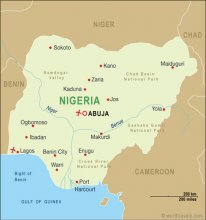Regional Background
Nigeria today is Africa's biggest producer of petroleum. The enormous potential for wealth has produced exploitation from outside and conflict within. The oil industry has brought environmental, economic and cultural devastation. Some 2 million barrels of oil a day are extracted in the Niger Delta. Much of the natural gas extracted in oil wells in the Delta is immediately burned, or flared, into the air at a rate of approximately 2.5 billion cubic feet per day. This is equivalent to 40% of African natural gas consumption, and forms the single largest source of greenhouse gas emissions on the planet. The environmental degradation associated with the lack of distribution of oil wealth have been the source and key aggravating factors of numerous environmental movements and inter-ethnic conflicts in the region, including guerilla activity by the Movement for the Emancipation of the Niger Delta.
The Niger Delta extends over about 70,000 square kilometres and makes up 7.5% of Nigeria’s land mass. Some 20 million people of more than 40 ethnic groups, speaking some 250 dialects live in the Delta. Originally, their livelihoods were primarily based on fishing and farming. The high population density created intensified pressure on the land, leading to increasing rural poverty. Low crop yield and loss of land to erosion have combined to induce people to migrate in search of other jobs. Now life in the Niger Delta has been drastically changed by development of oil resources.





